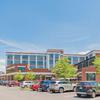The Allan government’s new rental reforms have been dubbed a “disaster” by property pundits.
The Allan government’s new rental reforms have been branded a “disaster” for tenants and landlords, with fears it will spark a renewed exodus of property investors.
A raft of new rights for renters were announced on Wednesday including ending no-fault evictions, penalising landlords for withholding bonds without evidence and capping rent payments to a maximum of four weeks worth if a tenant breaks their lease.
Real Estate Institute of Victoria chief executive Kelly Ryan said none of the six measures would support rental providers and targeted a market that had experienced constant regulatory change.
RELATED: Proof Victorians are fleeing to new ‘promised land’
Revealed: 200 suburbs where Melb rents have jumped $100pw+
Key problem with Allan govt’s construction watchdog plan
She added that these measures failed to attract landlords, which Australian Taxation Office data shows include tens of thousands of teachers, nurses and electricians.
Ms Ryan also warned landlords were now exiting the market at an unprecedented rate.
“We certainly do advocate for renters having a safe, secure property … (but) the unintended consequences (of these measures) is if there’s less investors in the market, then there’s less properties,” she said.
“Most renters would prefer to be able to have a house that they can afford as opposed to not having access to potentially one at all.”
Almost 90 per cent of landlords are private investors with the majority owning just one rental property, according to the state’s real estate peak body.
The number of active bonds held by the Residential Tenancies Bonds Authority dropped by about 22,000 in the year to June 2024, indicating rental properties were being removed from the market faster than they were being bought by new investors.
PICA chair ben Kingsley said these rental reforms were an “onslaught”.
Property Investors Council of Australia (PICA) chair Ben Kingsley said this was just another sign the Victorian government didn’t want property investors and landlords in the state.
“All evidence points towards consumer protection, but unfortunately, the investors are running a business and all they feel like is being pushed out of the state of Victoria,” Mr Kingsley said.
“We’ve already lost about 22,000 rental properties based on the bonds data. So how many more is enough?
“It’s an onslaught.”
He added that although these reforms were well meaning, it didn’t give the investor much confidence to invest or maintain their investment in Victoria.
“Less investment means less supply. Less supply means tighter rental accommodation, and ultimately higher rents and lower choice for renters,” he said.
“It’s already a disaster, but it’s going to get worse before it gets better.”
PIPA chair Nicola McDougall said these new reforms were “mind blowing”.
Property Investment Professionals of Australia (PIPA) chair Nicola McDougall said it “beggars belief” the Allan government had imposed further anti-investor policies given it was the least favourable state or territory for property investment already.
“Given the continuation of the rental crisis, it really is just mind blowing … that the state government has decided to instigate even more punitive policies which target investors.
“Investors in Victoria especially are sick and tired of being treated so appallingly by the state government, and they’re selling, and that is fundamentally reducing the supply of rental accommodation in Victoria.”
She said now was the time for the Allan government to get property investor representatives to the table and work collaboratively to address the rental crisis.
Tenants Victoria chief executive Jennifer Beveridge agreed with Premier Jacinta Allan that tenants’ rights were all about respect.
However, Tenants Victoria chief executive Jennifer Beveridge said they saw these reforms as part of paradigm shift towards renters’ having stronger rights.
“There is a growing acceptance of a community expectation that renters shouldn’t have to move all the time from rented home to rented home, and be able to choose how long they stay,” Ms Beveridge said.
“These reforms do not solve the issue of tight supply to help curb the rental crisis in Victoria, but they do help reduce the churn that affects so many renters who end up moving homes far too often.”
Better Renting executive director Joel Dignam said the headline reform of ending no-grounds terminations would, in practice, make tenants more confident about exercising their rights because they wouldn’t have to worry about being kicked out their rental without a reason.
He added that it was difficult to draw a causal link between rental reforms and disinvestment.
Mr Dignam said it would be “pretty crazy” for an investor to decide to sell their property based on reforms that they had to provide evidence for a bond claim or limited the amount of money a tenant had to pay if they decided to end their lease.
— Additional reporting by Mitch Clarke
Sign up to the Herald Sun Weekly Real Estate Update. Click here to get the latest Victorian property market news delivered direct to your inbox.
MORE: Online shopping tycoon buys two neighbouring Toorak homes
Capp’s Yarra River park plan wins award, but may never be built
Stuff of nightmares: Price growth in Australia’s haunted suburbs
sarah.petty@news.com.au



















 English (US) ·
English (US) ·